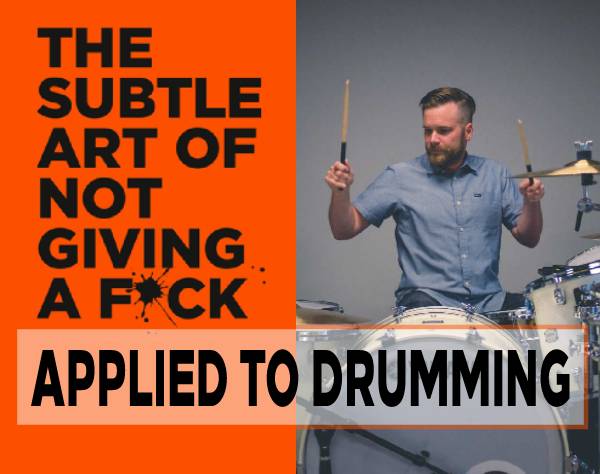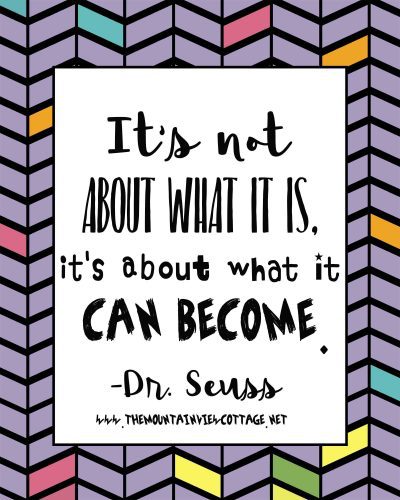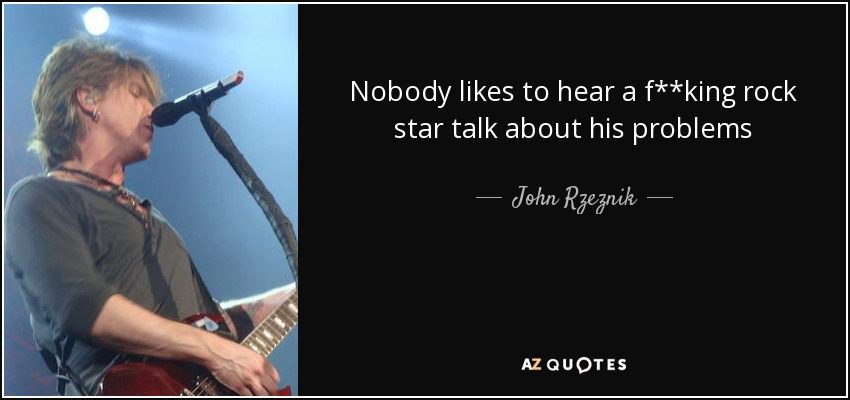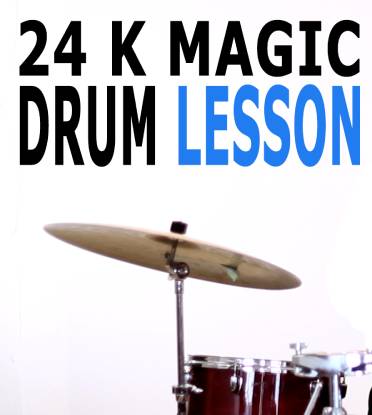
Download the FREE values worksheet

Elijah is a university-educated drummer with extensive experience for both teaching and musical performance. Since completing his Bachelor of Music degree at Concordia University in 2010, he has played music across each province in Canada and in more than 20 countries around the world. For information about private lessons at his studio in Montreal or for lessons on Skype visit: Elijah Drums
One of the areas of drumming that doesn’t get talked about a lot is the psychological aspect. The thoughts that go through your mind when you play can have a big impact on how you feel and therefore affect how you sound. Mark Mason’s book The Subtle Art of Not Giving a Fuck has some great lessons that can be applied to drumming. One of the issues is that we tend to give a fuck about way to many things when we play music. These “fucks” can sometimes rob all the joy out of playing. This post will discuss how we can learn to work with our negative thinking and channel it into personal growth.
Some of the fucks that go through my mind when I play are:
“I wonder what this person in the audience is thinking about me”
“I sound nervous.”
“Damn I just made a huge error, I’m sure everyone thinks I suck.”
“I wish more people would tell me how great they think my drumming is.”
Giving a Fuck about all these things really isn’t productive. It’s important to learn to identify these thoughts and figure out how to work with them. This is easier said than done, but if you never try to work on them they may never go away.
Values
The idea is to identify healthier values within ourselves and learn to only give a fuck about the things that are truly important. Values can be thought of as the underlying metrics that we use to judge ourselves. It’s important to understand what is motivating our thoughts and behaviours and ask yourself “is this way of thinking serving or hurting me?” This is constantly evolving and isn’t necessarily easy identify, but if we put a bit of energy towards working on it we can experience greater joy and feelings of success.
Values underlie everything we are and do. If what we value is unhelpful, if what we consider success/failure is poorly chosen, then everything based upon those values…will be out of whack. – Mark Mason
Defining good and bad values
In the book, Mark provides an outline of what makes good and bad values to measure ourselves with.
Good values are 1) reality based 2) socially constructive and 3) immediate and controllable.
Bad values are 1) superstitious 2) socially destructive 3) not immediate or controllable.
Transforming bad values into good ones
A bad value would look like this: How well I play the drums defines my self worth. This is a bad value, because from night to night, you won’t always play perfectly. Some nights you will be “on one” tearing it up, while other nights you will be making mistake after mistake. Consequently, your experience as a musician will be pretty bi-polar. It’s obviously normal to be a bit happier when you are “on,” but ultimately when you think about it, the most important thing to value is your intention and desire to serve the music. Did you spend the proper amount of time practising the material? Did you do your best to stay present and give your best attention to the music, are you being respectful and friendly to your bandmates and to the audience? Can you learn to be at peace with the ups and downs of your level of performance? These values are better because ultimately you have control over them.
List of good vs. bad Values to hold
Good Value: As long as I tried to the best of my abilities, I should feel proud of my playing.
Bad Value: My playing should always be perfect.
Good Value: There will always be people who are more accomplished than me and there are also people who are less accomplished. In the end my level of playing isn’t the most important thing.
Bad Value: I am only worthy of respect If I am the best drummer in the room.
Good Value: It’s not about what it is, it’s what it can become – Dr. Seuss. It’s about always learning and improving.
Bad Value: Talent is king. You either have it or you don’t.
Good Value: What can I learn from other great drummers?
Bad Value: Other drummers are my competition.
Good Value: Everyone has bad and good nights. it’s 50/50.
Bad Value: I must always sound amazing.
Good Value: Drumming doesn’t entirely define who I am.
Bad Value: My self-worth is based on how well I sounded in front this or that person.
Next time you are out playing at a gig, do a bit of journaling at the end of the gig. Ask yourself what were the difficulties that you experienced? What thoughts were going through your mind? What are the important values that your are using to evaluate yourself? Download the Free Values Worksheet.
Honest self-questioning is difficult.It requires asking yourself simple questions that are uncomfortable to answer – Mark Mason
Rock Star Problems:
We are constantly comparing ourselves to others. I hear stories of musicians that are playing at the elite level in Montreal yet they still feel as though they aren’t good enough. There is obviously something going on inside of them where their values and metrics for success are outside of their control. When will they be good enough? When will those destructive thoughts subside? The answer is probably never… until at least they re-examine their values.
In the book, Mark offers an example of two musicians that experienced failures, but both coped with them in different ways. The first musician is guitarist Dave Mustaine who was fired from the band Metallica. He then made it his lifelong quest to start a new band and become even more successful than Metallica. He then worked extremely hard and went on to form the band Megadeath which had amazing success. The problem is that Mustaine always felt like a failure because he never did achieve greater success than his former bandmates. His metric for success was to become more successful than Metallica and by that metric he failed. The other example he writes about is drummer Pete Best who was famously fired from the Beatles. Despite spending many years feeling like he was cheated, he eventually went on to be grateful for not being part of the Beatles because he never would have met his wife and had the family that he had. His values or his metric for success had shifted, and having a simple family life was what he truly wanted. He even continued playing drums, touring and recording albums into his later years.
These stories are inspiring because they show us that it’s up to each individual to examine themselves and decide what is important to them. We must ask ourselves what values will help me feel at peace with myself and allow me to be happy about where I am as a musician. Every drummer has a different upbringing, level of talent and education. We are all given a different set of cards in life. What is most important is to learn to be at peace with where we are. I like to think that personal metric for success is to always give my best to any given playing situation, while accepting myself as much as possible. It’s not productive to think that somebody could do a better job that you. as long as I am being respectful to the music and trying my best, than I shouldn’t feel bad about it.
Solving problems is the secret sauce
Happiness comes from solving problems. The secret sauce is in solving the problems, not in not having problems in the first place.
If you look at your drumming in this light, it helps can help you refocus on the process of being a musician rather than on the results. Whatever issues or negative thoughts you are struggling with, those very things can become the fuel of your progress and consequently your happiness. If you are feeling stuck about something about your playing, for example, you have a problem with your time, you play too loud or too soft, you get nervous on stage, or you believe that drumming isn’t a real career. Whatever it is, once you can identify and make peace with it, there is always ultimately a way to improve that thing.
For example, I’ve had an issue with drumming loudly and playing with power. I know that most drummers actually find it easier to play loudly than softly, but I actually have the opposite issue. To make matters worse, I’ve dealt with some repetitive strain injuries, which makes playing loud and powerfully kind of painful. This has been a real point of difficulty in my drumming. I decided to deal with this problem by investing a lot of time and energy into studying technique. I sought out world renowned teachers that have helped me play with more power without pain or tension. One of the techniques that has helped a lot is the Moeller Technique. Learning great technique and improving this aspect of my playing has been a huge source of joy and happiness.
What is the pain you want to sustain?
This is an amazing question for helping one define their path in life and as a musician. Visualizing and seeing yourself be successful is a bit of a shallow way of defining what you want out of life. Because the reality is that the process of realizing your vision can be a long and difficult one and unless you can find a way to enjoy the journey, chances are that vision isn’t going to really be worth it. What activities in the process of being a musician do you like to do? What challenges make you excited to confront? Doing more of those things might help clarify where you are most likely to be successful.
Improvement at anything is based on thousands of tiny failures. The magnitude of your success is based on how many times you failed at something.
Painful experiences and growth
If someone is better than you at something it’s because they’ve persisted through more painful experiences. If they aren’t are advanced as you, they’ve been through less painful learning experiences.
The mass media and youtube show us all these successful people without showing us the thousands of hours of dull practise and tedium that were required to achieve that success.
My own story about pain and growth
When I was in my last year of university as a music major for jazz drumming, I came down with a bad case of repetitive stress injury in both my wrists and was forced to temporarily quit playing drums. To make matters worse, I was just completing my degree and was thrown into the real world to figure things out on my own. My entire social life and skillset that I had been developing was based around music, which meant that I had to figure out a path forward to start earning a living but I couldn’t even play my drums. Suffice it to say that I felt like a big failure and I fell into a deep depression that lasted around a year. Slowly, after seeing several physical therapists, I began playing again. I started to develop a heightened awareness of the importance of respecting my body and good drumming technique. I became interested in health and nutrition, practising yoga, and most importantly I scoured the internet for every technique video I could find. I learnt about the Moeller technique, the free-stroke, stick rebound, fulcrum points and much more. I sought out world-class teachers to help me develop these techniques. Now, fast forward 10 years, I am in great physical shape and I am a much better player than I was before my injuries. The pain I experienced back in my early twenties is directly linked to the motivation I found for developing good technique. I never would have cared so much about it if it wasn’t for this painful experience. In fact, at the time, I looked down on drum technique and felt that drummers that focused on it too much sounded mechanical. I realized however that good technique actually is more about playing with ease and avoiding pain and injury. All the pain I experienced due to my injuries became the catalyst that led to a shift in values about what is important in drumming. Further, I probably wouldn’t be as good at teaching music because I wouldn’t have learned all these great exercises that helped me move into a growth mindset.
Thanks for reading! Leave comment about what values in music are important to you:
For more information about drum lessons at my studio or on Skype, please visit Elijah Drums




